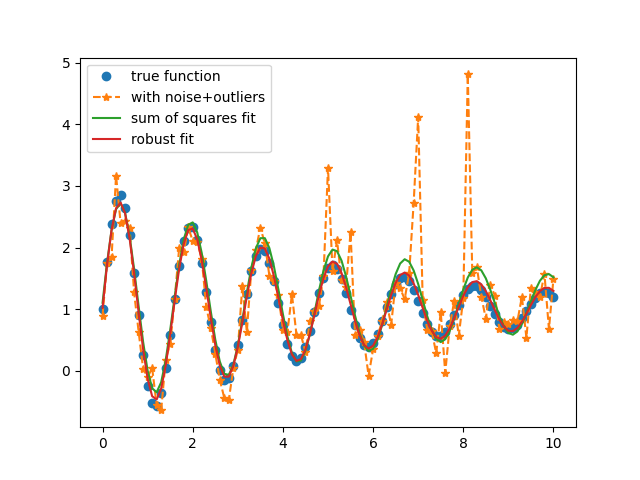Note
Click here to download the full example code
Fit Specifying Different Reduce Function¶
The reduce_fcn specifies how to convert a residual array to a scalar value for the scalar minimizers. The default value is None (i.e., “sum of squares of residual”) - alternatives are: ‘negentropy’ and ‘neglogcauchy’ or a user-specified “callable”. For more information please refer to: https://lmfit.github.io/lmfit-py/fitting.html#using-the-minimizer-class
Here, we use as an example the Student’s t log-likelihood for robust fitting of data with outliers.

Out:
# Fit using sum of squares:
[[Fit Statistics]]
# fitting method = L-BFGS-B
# function evals = 130
# data points = 101
# variables = 4
chi-square = 32.1674767
reduced chi-square = 0.33162347
Akaike info crit = -107.560626
Bayesian info crit = -97.1001440
[[Variables]]
offset: 1.10392444 (init = 2)
omega: 3.97313427 (init = 3.3)
amp: 1.69977080 (init = 2.5)
decay: 7.65901204 (init = 1)
# Robust Fit, using log-likelihood with Cauchy PDF:
[[Fit Statistics]]
# fitting method = L-BFGS-B
# function evals = 130
# data points = 101
# variables = 4
chi-square = 33.5081495
reduced chi-square = 0.34544484
Akaike info crit = -103.436516
Bayesian info crit = -92.9760337
[[Variables]]
offset: 1.02005941 (init = 2)
omega: 3.98224469 (init = 3.3)
amp: 1.83231477 (init = 2.5)
decay: 5.77326571 (init = 1)
/Users/Newville/Codes/lmfit-py/examples/example_reduce_fcn.py:72: UserWarning: Matplotlib is currently using agg, which is a non-GUI backend, so cannot show the figure.
plt.show()
import matplotlib.pyplot as plt
import numpy as np
import lmfit
np.random.seed(2)
x = np.linspace(0, 10, 101)
# Setup example
decay = 5
offset = 1.0
amp = 2.0
omega = 4.0
y = offset + amp * np.sin(omega*x) * np.exp(-x/decay)
yn = y + np.random.normal(size=y.size, scale=0.250)
outliers = np.random.randint(int(len(x)/3.0), len(x), int(len(x)/12))
yn[outliers] += 5*np.random.random(len(outliers))
def resid(params, x, ydata):
decay = params['decay'].value
offset = params['offset'].value
omega = params['omega'].value
amp = params['amp'].value
y_model = offset + amp * np.sin(x*omega) * np.exp(-x/decay)
return y_model - ydata
params = lmfit.Parameters()
params.add('offset', 2.0)
params.add('omega', 3.3)
params.add('amp', 2.5)
params.add('decay', 1.0, min=0)
method = 'L-BFGS-B'
o1 = lmfit.minimize(resid, params, args=(x, yn), method=method)
print("# Fit using sum of squares:\n")
lmfit.report_fit(o1)
o2 = lmfit.minimize(resid, params, args=(x, yn), method=method,
reduce_fcn='neglogcauchy')
print("\n\n# Robust Fit, using log-likelihood with Cauchy PDF:\n")
lmfit.report_fit(o2)
plt.plot(x, y, 'ko', lw=2)
plt.plot(x, yn, 'k--*', lw=1)
plt.plot(x, yn+o1.residual, 'r-', lw=2)
plt.plot(x, yn+o2.residual, 'b-', lw=2)
plt.legend(['True function',
'with noise+outliers',
'sum of squares fit',
'robust fit'], loc='upper left')
plt.show()
Total running time of the script: ( 0 minutes 0.127 seconds)